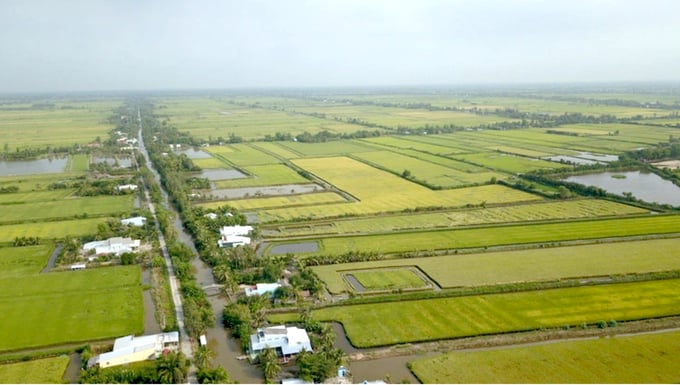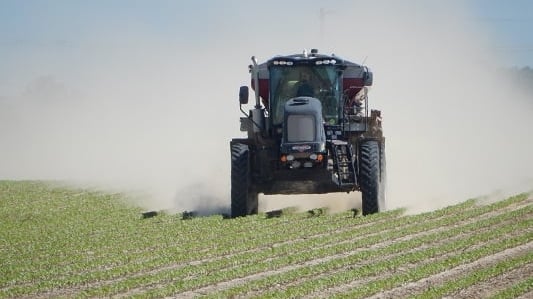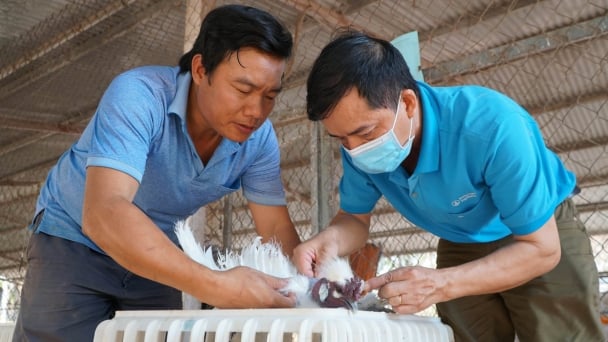May 14, 2025 | 15:38 GMT +7
May 14, 2025 | 15:38 GMT +7
Hotline: 0913.378.918
May 14, 2025 | 15:38 GMT +7
Hotline: 0913.378.918

At the present moment, the Mekong Delta has an estimated 29,260 hectares of rice area are susceptible to the detrimental effects of saline intrusion. This region is included in the one in which farming is discouraged after January 15.
Farmers sowed this portion of the late winter-spring crop over the planned schedule. The Department of Water Resources reports that the Mekong Delta is currently experiencing its highest salinity level during the dry season of 2023-2024. This trend is projected to continue until the end of the dry season, which is anticipated to occur around April to May of this year.
At the present moment, an estimated 29,260 hectares of rice are susceptible to the detrimental effects of saline intrusion. This region is included in the one where farming is discouraged after January 15. In particular, the following areas are measured by area: 1,400 hectares in Tien Giang, 2,500 hectares in Ben Tre, 13,000 hectares in Tra Vinh, 6,000 hectares in Soc Trang, and 6,360 hectares in Ca Mau.
The Mekong Delta region has cultivated rice on an area of 1.499 million hectares for the winter-spring harvest of 2023-2024, 99.98% of the original plan of 1.5 million hectares. As of now, an estimated 575,000 hectares have been harvested, which includes the complete area that was sown in early October and November 2023 to prevent saline intrusion.
The construction of the Nguyen Tan Thanh sluice gate in Tien Giang province has been expedited in response to saline intrusion. This structure will aid in the prevention of saltwater intrusion, the retention of freshwater, and the safeguarding of agricultural production across an area of around 12,580 hectares.
According to the Department of Water Resources, elevated salinity levels are likely to occur between March 7 and 13, as well as March 24 and 28. It is anticipated that the maximal salinity intrusion depth at the branch mouths of the Mekong River, where the salinity level is 4g/l, will range from 50 to 65 kilometers.
During periods of high tide, salinity intrusion impacts the water intake of irrigation works situated at a distance of 50-60 kilometers from the coast. It is anticipated that the Vam Co Dong and Vam Co Tay rivers will attain their maximum salinity level of 4g/l between 80 and 85 kilometers, 11 to 15 kilometers higher than the previous maximum levels recorded at the onset of the dry season.
During days with high tide, salinity intrusion also affects the water intake of irrigation works situated within 75 kilometers or less of the coast.
Preparing for these predictions, the Department of Water Resources advises municipalities to augment their surveillance and prediction of salinity intrusion into water sources to coordinate suitable responses. Residents are still advised by local authorities not to cultivate rice in regions susceptible to salinity intrusion and to wait for a stable water supply and adequate rainfall before planting rice.
Translated by Linh Linh

(VAN) Vietnam's draft amendment to Decree No. 156 proposes a mechanism for medicinal herb farming under forest canopies, linking economic development to population retention and the sustainable protection and development of forests.

(VAN) In reality, many craft village models combined with tourism in Son La have proven effective, bringing significant economic benefits to rural communities.

(VAN) The international conference titled Carbon Market: International experiences and recommendations for Vietnam was successfully held recently in Ho Chi Minh City.

(VAN) According to the Project on rearranging provincial and communal administrative units, in 2025, the country will have 34 provinces/cities, 3,321 communes, wards, and special zones, and no district-level organization.

(VAN) The vice president of fertilizer with Stone X Group says the Trump administration’s tariffs are impacting fertilizer markets.

(VAN) Resolution 57 offers Vietnam a significant opportunity to narrow the global genetic technology disparity and convert its extensive genetic resources into commercial advantages.

(VAN) The Ministry of Agriculture and Environment will prioritize the implementation of five core and breakthrough solutions in science and technology, in addition to the seven groups of tasks identified in Decision No. 503.